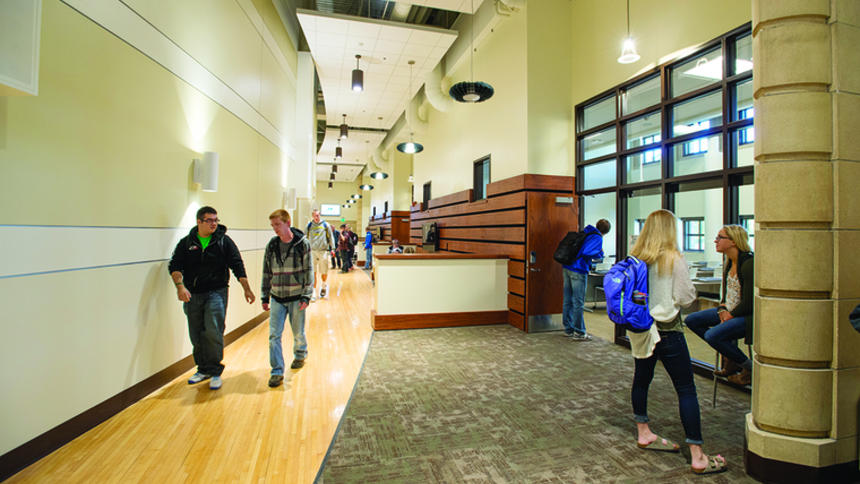
Memorial Hall interior. Bemidji Pioneer photo.
You’d be hard pressed to find a better location for a university with an environmental emphasis in its mission. Poised on the shores of Lake Bemidji, nestled in the northwoods, BSU has long been committed to environmental protection.
In the past 40 years, BSU has engaged with many environmental efforts such as native shoreline restoration, natural landscaping, purchasing wind energy to power its student union and offering a “Free Store” to students where gently used goods can be donated and reused instead of thrown away. And this fall, students, faculty and staff are starting to study and work in BSU’s first ever LEED certified building.
LEED, or Leadership in Energy and Environmental Design, is a building certification program that awards best practices and “green” building design strategies. In order to be certified, building projects first have to satisfy a number of prerequisites and can then earn points by integrating additional green building strategies to achieve different levels of certification. There is a basic LEED certification level, then silver, gold and platinum ratings associated with higher point levels. The Memorial Hall renovation is BSU’s first LEED project and a will strive for a silver level rating upon completion.
“When we decided to remodel Memorial Hall, we had a chance to do something that reflects who Bemidji State University is. Environmental Stewardship is one of our shared fundamental values and we wanted to pursue LEED certification to help raise consciousness and demonstrate our commitment to sustainability” said President Richard Hanson.
Karen Snorek, BSU’s vice president of finance and administration offered that although “LEED’s third party verification process requires certification fees and a large amount of work by the project team to document the process, the services LEED provides offer the benefit of ensuring higher building performance with lower long-term operating costs than a building designed and constructed only to building code standard.”
Memorial Hall has been redesigned to use 21 percent less energy and 41 percent less water than a conventional building, which will result in cost savings for the university.
LEED certification is something the student body supports. BSU´s Student Senate previously passed a bill urging all future building projects be LEED certified. Bill Maki, former vice president of finance and administration, who was instrumental in the Memorial Hall project becoming LEED certified, noted that “all current state capital projects already adhere to Minnesota Sustainable Building Guidelines, which are also known as B3 standards. B3 standards are roughly equivalent to LEED Silver certification.” Therefore, because new buildings are required to meet this standard, Snorek noted that “there may or may not be a need for future projects to specifically pursue LEED certification.” However she highlighted that “one advantage for LEED is that it is nationally and internationally recognized, which will help in attracting and retaining top students and faculty where the B3 program is regional and not as well known or understood by the general public.”
Erika Bailey-Johnson, BSU’s sustainability director, sees additional benefits to LEED certification in that “LEED goes beyond pure energy and water conservation measures and awards points for purchasing materials from local vendors, educating building occupants about conservation strategies, sustainable landscaping and adding bike racks and electric vehicle charging stations”. B3 standards do not take these broader strategies into consideration.
Being a signatory of the American Colleges and Universities President’s Climate Commitment, BSU has committed to become carbon neutral by the year 2050. Bailey-Johnson believes that sustainable building practices will be key if they are to achieve that goal. “There is little value in investing in renewable energy projects if buildings are not utilizing passive energy, energy efficiency and other conservation strategies,” she said.
Hanson acknowledged that there is often a push-pull on campus with regard to sustainability issues. “At a minimum we have to seek a balance between what is and what might be,” he said. “If we let what is dominate, nothing changes and we hesitate to innovate and lead. Here at BSU we are demonstrating our leadership through our actions.”
To learn more about the Memorial Hall renovation project and other ways in which BSU is leading through their commitment to environmental stewardship, visit the Sustainability Office website: www.bemidjistate.edu/offices/sustainability or contact Bailey-Johnson at EBaileyJohnson@bemidjistate.edu or (218) 755-2560. And if you’re interested in learning more about LEED certification in general or the points and rating levels associated with the process, visit www.usgbc.org/leed.
